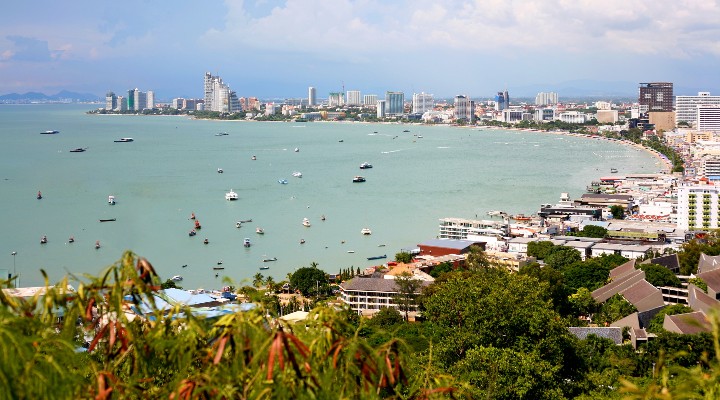Thailand, a nation of almost 70 million, is, along with much of Southeast Asia, in a self-induced coma. Lacking a clear Covid-19 exit strategy, the central and 77 provincial governments are making it up as they go along, locking this or that down, enforcing curfews in that city or this province, issuing this or that new directive to tighten control over its citizens. None of the improvisations are working. It is a bumbling reprise of the politician’s fallacy in the famous British sitcom Yes, P
rime Minister: “Something must be done. This is something. Therefore we must do this.”
But tomorrow is a new day, isn’t it? And in a country that places so much faith in luck that a third of the population plays the lottery, you just never know — things might turn out for the best. One day.
Meanwhile, entire retail and entertainment sectors are being decimated. The sudden withdrawal of international tourist spending in Thailand’s three most visited cities when the country closed its borders in March last year — Bangkok, Phuket and Pattaya — deleted an estimated six per cent of GDP at a single stroke. International visitors made 36.5 million trips to Thailand in 2019 but only 6.7 million in 2020, almost all of those in the first three months of the year.
The negative hit to retail, food and beverage in the three cities easily reached US$15 billion in 2020, and that isn’t counting spending on entertainment, much of which is off the books. The picture has worsened further in 2021.
As in much of Southeast Asia, the economic plight of Thailand is broad-based, but you wouldn’t know it if you were a consumer of the official statistics, which include, for example, a fanciful unemployment rate of 1.96 per cent in the first quarter of 2021. The real rate is probably at least an order of magnitude higher. It is perhaps understandable that the statisticians think they can get away with fudging things: this isn’t a part of the world where much of the party line gets to be challenged.
Thailand certainly isn’t alone in this respect. Neighbouring countries such as Cambodia, Laos, Vietnam and Malaysia — all authoritarian regimes or only nominally democratic — are equally devout followers of the same politician’s fallacy as Thailand. Large swathes of some cities have empty streets lined with shuttered shopfronts festooned with the contact phone numbers of desperate owners trying to sell.
Not surprisingly, the epicentre of the retail pain is in close-contact businesses such as cafes, restaurants, entertainment venues, fitness centres, massage shops, salons and all retail that revolves around office workers and tourism. Many of these businesses have made at least one attempt to reopen, but, like a groggy boxer who rises from the canvas only to receive the knockout blow, successive hard and soft lockdowns have put many of them out for the count.
Some shop owners, trusting and believing that their lockdown purgatory will eventually end, have invested in renovations. Others have managed to sell to opportunists at fire-sale prices. Some have pivoted to different businesses. For example, bars (which have often not been allowed to open) have rebadged themselves as restaurants (which often have been). Some have been kept on life support by delivery apps, but in many of the street shops and even in the air-conditioned malls in those locations where they are allowed to stay open, dejection has given way to acceptance and boredom. Many barely look up from their phones anymore to spruik their merchandise to passers-by. The queues for food handouts snake up blocks and twist around corners.
The Phuket Sandbox
But all is not lost. Down in Phuket, the island paradise flanked by the sparkling Andaman Sea that received more than 10 million international visitors in 2019, the provincial government kicked off an experiment on July 1, whose proponents hope will breathe life back into the country’s moribund tourist industry. It’s piloting a bubble scheme for tourists called the Phuket Sandbox, whereby vaccinated tourists are allowed to visit the island if they are willing to undergo a raft of screening procedures and stay at approved accommodations for a minimum of 14 days.
The scheme has encountered some public relations bumps. For example, when 13 of the tourists found out from authorities that they had been exposed to an infected individual on an inbound flight and were required to hole up in a quarantine facility instead of enjoying their prepaid digs and the freedom of the island.
It is difficult to say whether the Phuket authorities had anticipated such setbacks or whether they took a ‘suck it and see’ attitude hoping that they would have luck on their side. Either way, they took a big risk, a sign of just how desperate the situation is for the local economy.
Squeeze on the sleaze
The unwillingness to take stronger measures to welcome mass tourism again is killing Thailand’s entertainment industry, which is justly world-famous for what some would consider the wrong reasons. The government has signalled, if only obliquely, that it might be using Covid as an opportunity to crush the sex industry, or at least force it out of the public glare by keeping its vaunted bars and discotheques closed for so long that their owners never have the wherewithal to reopen. They want the big sex destinations, including the tourist ghettoes in Bangkok, to be more family-friendly and ‘toney’.
If that is indeed the goal, then there’s a good chance it will succeed. Estimates of the number of people associated with the sex industry vary widely, but it isn’t inconceivable that it exceeds a million. When their workplaces were shuttered by government order, many turned to freelance, but many returned home, often to the Thai countryside where they have extended families but no jobs.
The legions of unemployed are not just in the entertainment industry, however. There are knock-on effects felt everywhere in the economy.

